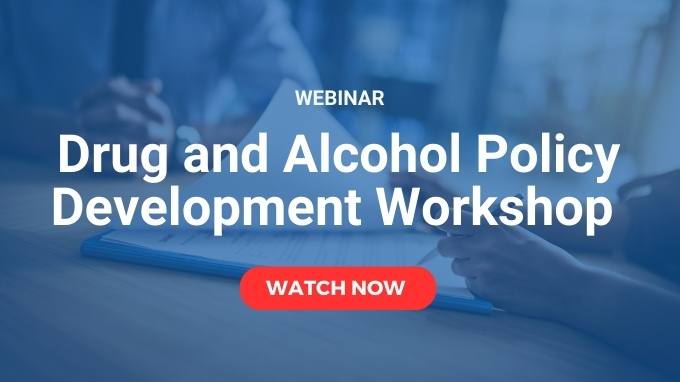Importance of Drug and Alcohol Policies in the Workplace
Drug and alcohol policy development in Australiais essential for maintaining a safe and compliant workplace. An effective policy helps businesses manage risks associated with substance abuse, ensuring that all employees understand their responsibilities and the consequences of policy violations. Developing and regularly reviewing these policies is crucial for fostering a healthy and productive work environment.
Steps to Develop a Drug and Alcohol Workplace Policy
Assessing Workplace Needs
The first step in drug and alcohol policy development and reviewis assessing the specific needs of your workplace. This involves identifying potential risks, understanding industry regulations, and considering the unique challenges your business might face. A thorough assessment ensures that the policy is tailored to address the actual issues in your workplace.
Drafting the Policy
Once the needs are assessed, the next step is to draft the policy. When you develop a drug and alcohol workplace policy, it’s important to outline clear objectives, define the roles and responsibilities of all parties involved, and establish the procedures for testing and handling violations. This stage is crucial for ensuring the policy is comprehensive and actionable.
Stakeholder Consultation
Involving stakeholders in the policy development process is vital for ensuring buy-in and compliance. Stakeholder consultation during policy development and review for drugscan include managers, employees, legal advisors, and health and safety representatives. Their input helps create a policy that is practical, fair, and aligned with the company’s goals.
Key Components of an Effective Drug and Alcohol Policy
Policy Objectives
Setting clear objectives is a key component of effective drug and alcohol policy development. These objectives should outline the policy’s purpose, such as maintaining safety, complying with legal requirements, and promoting a healthy workplace. Clear objectives guide the implementation and enforcement of the policy.
Roles and Responsibilities
A well-developed drug and alcohol workplace policy should clearly define the roles and responsibilities of everyone involved. This includes managers, employees, and external contractors. Specifying these roles ensures that everyone knows their duties in maintaining a substance-free workplace and how to respond to policy violations.
Testing Procedures
An essential part of any drug and alcohol policy is the testing procedures. This section should detail how and when testing will be conducted, the types of tests used (such as a urine drug screen in Australia), and the process for handling results. Clear procedures help ensure the testing is fair, consistent, and legally compliant.
Consequences of Policy Violation
The policy should also specify the consequences of violating the drug and alcohol policy. This includes disciplinary actions, support options such as referral to drug and alcohol training, and the process for appeals. Clearly outlining these consequences helps deter violations and ensures that all employees understand the seriousness of the policy.
Legal Considerations in Policy Development and Review
Legal compliance is a critical aspect of drug and alcohol policy development in Australia. Employers must ensure that their policies comply with federal and state laws, including privacy regulations and occupational health and safety standards. Regularly reviewing policies helps ensure they remain compliant with any legal changes.
Reviewing and Updating Existing Policies
Identifying Policy Gaps
Regularpolicy development and reviews for drugs in Australiaare essential to identify any gaps in existing policies. These gaps might arise due to changes in the law, evolving workplace conditions, or new insights into substance abuse. Identifying and addressing these gaps ensures that the policy remains effective and relevant.
Incorporating Feedback
Incorporating feedback from employees, managers, and other stakeholders is crucial when reviewing and updating policies. This feedback can provide valuable insights into how the policy is working in practice and where improvements might be needed. A responsive approach to feedback helps keep the policy aligned with workplace realities.
Benefits of Regular Policy Reviews
Conducting regular reviews of your drug and alcohol policy ensures that it continues to meet the needs of your business and complies with legal standards. Regular reviews help in adapting the policy to new challenges, such as changes in workforce demographics or the introduction of new substances that might be abused. This proactive approach helps maintain a safe and healthy workplace.
Drug and Alcohol Policy Development In Australia
To ensure the effectiveness of drug and alcohol policy development, it’s important to follow best practices. This includes regular training for employees on the policy, clear communication about policy updates, essential health checks, such as the QLD coal board medical and consistent enforcement. Additionally, integrating other workplace safety measures, such as pre-employment drug and alcohol testing in Australia and occupational health services, supports a comprehensive approach to workplace health and safety. Safework Health can help develop a drugs and alcohol workplace policy tailored to your specific needs, ensuring compliance with legal standards and promoting a safe, substance-free work environment.





